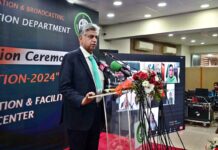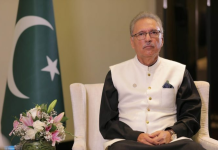ISLAMABAD, Dec 12 (APP): Executive Director of the Inter Boards Coordination Commission (IBCC) Dr. Ghulam Ali Mallah, has showcased Pakistan’s transformative educational initiatives at the GEMS-IBBC Autumn Conference 2024 held in Dubai.
Dr. Mallah also emphasized the transformative initiatives being undertaken by the IBCC to enhance educational standards and foster innovation in Pakistan, said a press release on Thursday.
In his address, Dr. Mallah highlighted the IBCC’s key role in Pakistan’s education system.
The commission processes over 150,000 equivalence cases annually, facilitating seamless transitions for students across diverse educational systems.
Additionally, the attestation department handles nearly 500,000 educational documents each year, serving domestic and international stakeholders.
IBCC also oversees examinations for more than five million students in grades 9 to 12, working closely with all Boards of Intermediate and Secondary Education (BISEs) to standardize policies nationwide.
“Through technological advancements and streamlined services such as online applications and fast-track processing, IBCC is enhancing accessibility and efficiency for students and stakeholders alike”, Dr. Mallah remarked.
Dr. Mallah highlighted several groundbreaking initiatives spearheaded by the IBCC, including: implementation of e-office systems, exam reforms and the development of minimum assessment standards for 30 examination bodies, continuous professional development programs, establishing national and international linkages and achieving international quality certifications.
“These efforts aim to standardize assessments, align practices with global benchmarks, and ensure inclusivity and fairness in our education system”, he said.
Dr. Mallah also presented an overview of Pakistan’s diverse educational landscape. With a population exceeding 240 million, over 63 million children aged 5 to 16 are in the education system. Among these, 42% are served by public schools, 26% attend private or non-formal institutions, while 32% are not enrolled in any school.
The higher education sector includes 247 universities, catering to two million students annually. He also underscored the critical importance of vocational and technical training to meet the growing demand for market-relevant skills.
“We aim to build bridges between different educational systems, promote innovation, and facilitate global collaboration” Dr. Mallah remarked. He commended the GEMS-IBBC Autumn Conference for fostering meaningful dialogue and collective action.
Dr. Mallah concluded with a call to action: “Together, we can expand education opportunities at all levels—school, higher education, and vocational training—ensuring our learners are well-prepared to meet 21st-century challenges. The future of our learners depends on the choices we make today.”
Expressing gratitude to the conference organizers, Dr. Mallah reaffirmed IBCC’s commitment to creating an equitable, innovative, and globally competitive education ecosystem.
مضمون کا ماخذ : apostas lotofácil














